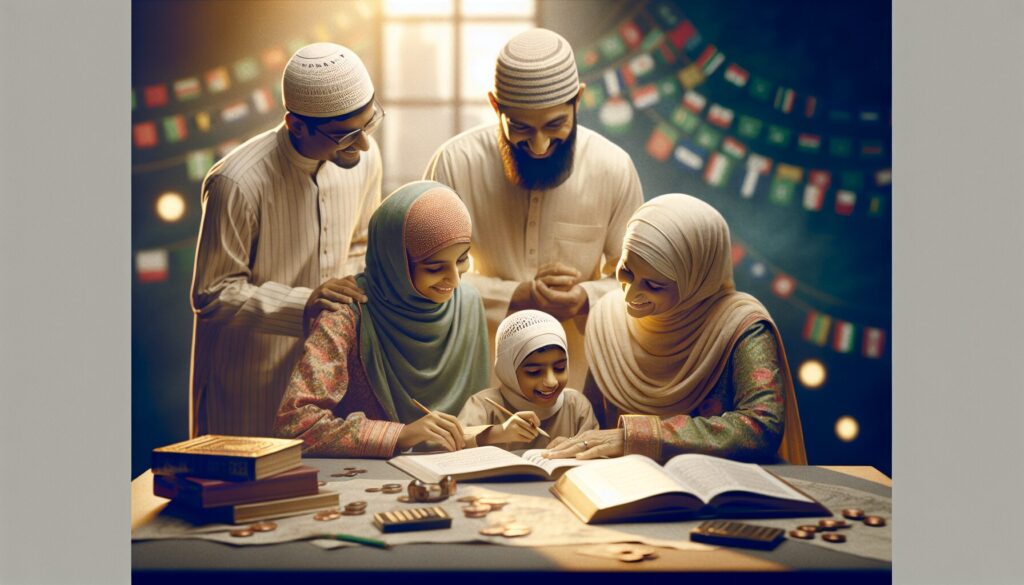Choosing a name for a little one is such a delightful journey! I remember when my cousin was expecting her first child, we spent hours flipping through name books and websites. It was like a treasure hunt, trying to find the perfect balance between tradition and modernity. Islamic baby names carry a special significance, as they often reflect beautiful meanings and historical connections. Did you know that many names are derived from Arabic words, which can describe traits or virtues? For example, the name ‘Amina’ means ‘trustworthy’ and ‘peaceful’. It’s amazing how a name can carry such depth and history. Let’s dive into this exciting world and discover how meaningful and powerful these names can be!
Importance of Meaning and Origin

Understanding the meaning and origin of a name is like uncovering a piece of history and culture wrapped in a few syllables. Names carry stories, values, and traditions, making them deeply significant. When choosing an Islamic baby name, this importance is magnified. Each name isn’t just a label—it’s a connection to heritage and spirituality.
The beauty of Islamic names is in their rich meanings and profound origins. Take, for instance, the name “Zainab.” It’s not just a name; it’s a legacy. It carries historical significance as it was the name of one of Prophet Muhammad’s daughters. This connection makes the name cherished and revered among many families. Similarly, “Bilal” evokes the story of the first muezzin, Bilal ibn Rabah, known for his unwavering faith and melodious voice. These names aren’t just chosen for their sound but for the stories they tell and the values they embody, much like the values taught when learning how to raise environmentally conscious Muslim children.
When selecting a name, parents often consider its origin, which can reflect a specific cultural or linguistic heritage. Arabic names are prevalent due to their direct ties to Islamic history and the Quran. However, names from Persian, Turkish, or other cultural backgrounds are also embraced for their beautiful meanings and historical significance. This diversity allows parents to choose a name that resonates personally while maintaining a connection to their faith.
Why Meaning and Origin Matter
Choosing a name with a meaningful background can provide a sense of identity and pride. Here are a few reasons why the meaning and origin of a name are so crucial:
- Connection to Faith: A name with Islamic significance can strengthen a child’s connection to their faith and its teachings.
- Cultural Heritage: Names with specific origins can celebrate and preserve cultural traditions, allowing families to pass down their heritage through generations.
- Personal Identity: Understanding the meaning behind their name can give a child a sense of personal identity and purpose.
When I was choosing a name for my own child, I found myself diving into stories and histories, much like a treasure hunt. Each name I considered came with tales of bravery, wisdom, or love. It was like reading chapters from an ancient book, each more fascinating than the last. This process wasn’t just about finding a nice-sounding name; it was about connecting my child to a tapestry of history and values. Organizations like Islamic Relief Worldwide and Al-Azhar University often highlight the importance of these connections, emphasizing how they shape personal and communal identity.
Therefore, when you’re on this journey, think of it as a delightful exploration of history and spirituality. Each name is a doorway to a vibrant past, waiting to be part of your child’s future. And isn’t that a wonderful thing to gift them?
Popular Islamic Baby Names for Boys
Choosing a name for your little bundle of joy is such an exciting journey, isn’t it? I remember when I was helping my cousin pick a name for her baby boy. We sat for hours with a pot of tea, sifting through beautiful names with deep meanings. It’s amazing how each name can carry such a rich background and significance. Now, let’s dive into some popular Islamic baby names for boys that have stood the test of time and are cherished by families around the world.
One name that always comes up is Muhammad. A classic and beloved name, it’s associated with the Prophet Muhammad, making it a name of great respect and admiration. You’ll find variations of it across the globe, from Al-Azhar University to local community centers. It’s a name that carries a sense of dignity and honor.
Then there’s Ali, which is cherished for its simplicity and profound meaning. Ali was the name of the Prophet Muhammad’s cousin and son-in-law, making it historically significant. It’s a name that symbolizes strength and loyalty, and it’s popular among many families.
Another gem is Omar. Known for its historical significance and strong yet gentle sound, Omar was the name of a prominent caliph known for his wisdom and leadership. This name is often chosen by parents who wish for their child to embody qualities of intelligence and fairness.
Modern Favorites
While traditional names hold a special place, modern parents sometimes look for names that resonate with today’s world. Zayd is one such name, offering a modern touch while being steeped in history. It means ‘growth’ or ‘abundance’, which is such a lovely sentiment for a child.
Yusuf is another timeless choice. It’s a name that conveys beauty and grace, inspired by the story of Prophet Yusuf, known for his patience and virtue. This name remains a popular choice for many families, bridging the gap between tradition and modernity.
When picking a name, many parents consult resources like A Beginner’s Guide to Islamic Baby Names and Their Meanings to ensure they understand the nuances and meanings behind each choice. Whether you lean towards traditional favorites or modern picks, the right name can be a beautiful way to start your child’s journey. Remember, a name isn’t just a label; it’s the first gift you give to your child, carrying your hopes and dreams for them.
Popular Islamic Baby Names for Girls
When choosing a name for a baby girl, popular Islamic names often come with deep meanings and beautiful sounds. They reflect not just cultural richness but also spiritual depth. I remember when my cousin was naming her daughter. She wanted something that resonated with her family’s values and had a nice ring to it. After a lot of thought, she settled on a name that everyone loved and felt connected to. It’s amazing how a name can carry so much significance.
Popular Islamic baby names for girls are often inspired by history, faith, and beauty. Each name offers a unique story or attribute, giving it a special place in the hearts of many families. Let’s explore some of these cherished names.
Names and Their Meanings
Names play a crucial role in shaping identity. Here’s a list of popular Islamic baby names for girls that are loved for their meanings and melodious tones:
- Aisha: Revered for its connection to Prophet Muhammad‘s wife, this name means ‘living’ or ‘life’. It’s a name cherished across generations.
- Fatima: This name is significant due to its association with Fatimah, the daughter of the Prophet Muhammad. It represents purity and is widely admired for its spiritual connection.
- Maryam: Known for its biblical and Quranic significance, Maryam is both timeless and elegant, representing piety and devotion.
- Sara: A name that symbolizes joy and delight, Sara is loved for its simplicity and historical importance, being the name of Sarah, the wife of Abraham.
- Layla: With its poetic allure, Layla means ‘night’ and is often associated with beauty and mystery.
These names reflect not just personal identity but also a connection to a broader cultural and spiritual heritage. Choosing the right name is a meaningful decision, often involving family discussions and a lot of consideration. It’s about finding a balance between tradition and modernity, ensuring the name resonates well within the family while standing out beautifully in the world.
Incorporating popular names into your list can make your selection process both exciting and enlightening, adding depth to the ‘Ultimate Islamic Baby Names Checklist’. Each name brings a story, a rich tapestry of history and faith, beautifully woven into the fabric of everyday life.
Tips for Choosing the Perfect Name

Picking the perfect name for your little one can be quite the adventure, right? I remember when my cousin was expecting her first child; she wanted a name that was not only meaningful but also resonated with her family’s heritage. We spent countless evenings with cups of tea and baby name books, laughing, debating, and imagining the future. It was such a bonding experience! Now, let’s dive into some tips that’ll help you choose a name that feels just right.
First, consider the significance of the name. Names often carry deep meanings and can reflect cultural or religious values. They’re not just labels, but a part of your child’s identity. For example, names like Amina or Bilal have rich histories and meanings that might resonate with your family. Think about what you value and how this can be reflected in the name.
Next, think about the sound and flow. Say the name out loud with your last name. Does it roll off the tongue? Is it easy to spell and pronounce? A name like Ali might be simple and elegant, whereas something more complex might require a bit more thought on pronunciation. You want a name that sounds harmonious and won’t lead to misunderstandings.
Incorporate Family and Cultural Heritage
It’s always a good idea to honor family traditions or cultural roots. You might want to consider names that have been passed down through generations or have significant cultural value. However, balance is key. While it’s wonderful to honor your heritage, it’s also essential that the name feels right for the present and future. For example, names like Zainab or Omar might carry familial significance while also fitting well into contemporary society.
Consider the future. Your child will grow up with this name, so think about how it might be perceived in different stages of life. Will it suit them as a child and as an adult? Names like Maryam or Fatima often carry a timeless quality, fitting seamlessly across different phases of life. Moreover, check how the name is perceived in different cultures if you’re living abroad or planning to travel often.
Incorporating these tips can make the naming process not only easier but also more meaningful. Remember, choosing a name is a special journey, and it’s okay to take your time with it. Whether you draw inspiration from Al-Azhar University or reflect on figures like Muhammad, the name you select will be a cherished part of your child’s identity.
Resources for Finding Islamic Baby Names
Finding the perfect Islamic baby name can feel like a treasure hunt, can’t it? When I was expecting my first child, I spent countless evenings with my nose buried in books and my fingers tapping away at the keyboard. It was a delightful journey, discovering names rich in meaning and history. I even stumbled upon names like Amina and Bilal that resonated deeply with me. If you’re on this beautiful quest, let me share some resources that can make your search both easy and enjoyable.
Books have always been a trusted source for names. They offer a wealth of information, often providing not just the meanings but also the historical significance behind each name. Consider checking out titles from Darussalam Publishers or Islamic Foundation, known for their comprehensive and reliable collections. These books are like having a wise old friend sitting on your bookshelf, ready to share stories and insights at any moment.
Online databases are another fantastic resource. Websites dedicated to Islamic baby names provide extensive lists, often categorized by origin, meaning, and popularity. Platforms like BabyNames and IslamicFinder are user-friendly and updated regularly, ensuring you get the latest trends and information. They can be your go-to for quick searches or in-depth research, depending on how deep you want to dive.
Another great place to look is community forums. These are vibrant spaces where parents-to-be gather to share their experiences and name ideas. It’s not just about finding a name; it’s about connecting with others on the same journey. You might discover a name like Maryam or Omar that you hadn’t considered before, shared by someone who cherished its meaning deeply.
Of course, personal connections can be invaluable. Reach out to family members or friends who might have insights into names that hold significance in your family’s history. You might uncover a gem that carries a beautiful legacy, like Zainab or Ali. Sometimes the simplest conversations can lead to the most profound discoveries.
Don’t underestimate the power of language apps. They can be a fun way to explore names and their pronunciations. Apps like Duolingo or Rosetta Stone might not be dedicated to baby names, but they can help you understand the nuances of Arabic pronunciation, adding another layer of appreciation to the names you choose.
Embarking on the search for the perfect name can be a meaningful adventure, filled with discovery and joy. Each resource, from books to community forums, offers a unique perspective, helping you find a name that’s not just beautiful but truly special.
Conclusion
Ultimately, choosing an Islamic baby name is not just about finding a pleasing sound but about embarking on a journey through rich histories, deep meanings, and cherished traditions that connect families across generations. This process, filled with exploration and reflection, allows parents to bestow more than just a label; they give their child a legacy of faith, culture, and identity that will accompany them throughout their life. May your naming journey be filled with joy and discovery, and may you find the perfect name that resonates with your heart and heritage. Happy naming!
Continue Exploring
Unlock the beautiful meanings behind Islamic baby names and add a touch of tradition to your name choices. Dive into this insightful guide perfect for new parents and name enthusiasts alike.
Frequently Asked Questions
Why is the meaning and origin of an Islamic baby name important?
The meaning and origin of an Islamic baby name are crucial because they often carry historical and cultural significance. These names are not just labels; they represent a connection to heritage, spirituality, and family traditions. Understanding the meaning can provide a child with a sense of identity and pride, while also celebrating cultural heritage and religious values.
What are some popular Islamic baby names for boys and their significance?
Some popular Islamic baby names for boys include Muhammad, Ali, and Omar. Muhammad is a classic name associated with the Prophet Muhammad, symbolizing dignity and admiration. Ali is cherished for its historical significance, representing strength and loyalty. Omar is known for its connection to a prominent caliph, embodying qualities of wisdom and leadership.
How can I find the perfect Islamic baby name?
Finding the perfect Islamic baby name can be achieved by using various resources such as books from publishers like Darussalam or Islamic Foundation, online databases like BabyNames.net and IslamicFinder, and engaging in community forums to gather experiences and ideas from other parents. Additionally, personal connections and language apps can provide insights into names that hold cultural or family significance.
Fatima Ansari is an Islamic educator and writer with over a decade of experience teaching Quran and Islamic studies to children and families in Western Muslim communities. Growing up in North America, she saw firsthand the challenges Muslim families face in balancing faith with modern life, which inspired her to share practical guidance rooted in the Quran and Sunnah. Her mission with E-Quran Learning is to make Islamic education accessible, relatable, and inspiring for Muslim families across the United States, United Kingdom, Canada, Australia, and New Zealand.






